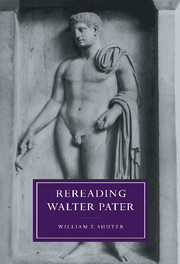Book contents
- Frontmatter
- Contents
- Preface
- Frequently cited sources and abbreviations
- Introduction: an initial reading
- 1 The periegetic critic and the imaginative sense of place
- 2 The retrojective apologist
- 3 Heraclitus, Hegel, and Plato
- 4 The dubious academic
- 5 Visiting the dead
- Conclusion: rereading, revising, and reshuffling
- Notes
- Bibliography
- Index
- Miscellaneous Endmatter
Introduction: an initial reading
Published online by Cambridge University Press: 22 October 2009
- Frontmatter
- Contents
- Preface
- Frequently cited sources and abbreviations
- Introduction: an initial reading
- 1 The periegetic critic and the imaginative sense of place
- 2 The retrojective apologist
- 3 Heraclitus, Hegel, and Plato
- 4 The dubious academic
- 5 Visiting the dead
- Conclusion: rereading, revising, and reshuffling
- Notes
- Bibliography
- Index
- Miscellaneous Endmatter
Summary
In the biographical sketch with which Pater began his early essay on Winckelmann (1867), the central motif is that of a journey. Intellectually, Winckelmann was like Columbus, relying on intuition rather than science to reach a new world. From the “tarnished intellectual world of Germany” he passed “with a sense of exhilaration almost physical” into “the happy light of the antique” and the “full emancipation of his spirit.” Dreaming for years of visiting Italy and Greece, he finally journeyed to Rome in 1755. The journey itself is compared to Dante's entrance into light from the “darkness of the Inferno.” The motif of the journey recurs in Pater's late fiction “Apollo in Picardy” (1893). For the sake of his health the learned Prior Saint-Jean is sent from the protective confines of the monastery in which he has been raised to a remote grange under the control of his order. In the countryside of Picardy, where pagan traditions still survive, he falls under the influence of a herdsman of strikingly noble appearance, actually the Greek god Apollo in disguise. Although recovered in body, Prior Jean becomes deranged in mind. Supposed guilty of the death of his young attendant, he is placed in confinement, where he dies, the treatise to which he devoted his life unfinished.
These two journeys appropriately introduce a study of the relation between Pater's later and earlier work. Most readers would agree that Pater changed with the passage of time and would describe the change in much the same way. Grown seemingly distrustful of the impulses that motivated his earlier work, Pater attempted to retract or severely modify his earlier positions.
- Type
- Chapter
- Information
- Rereading Walter Pater , pp. 1 - 15Publisher: Cambridge University PressPrint publication year: 1997



